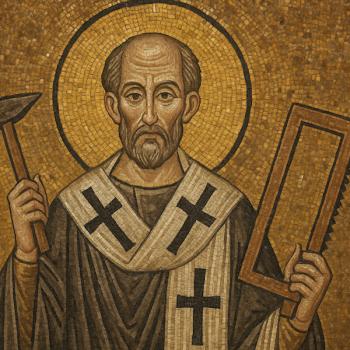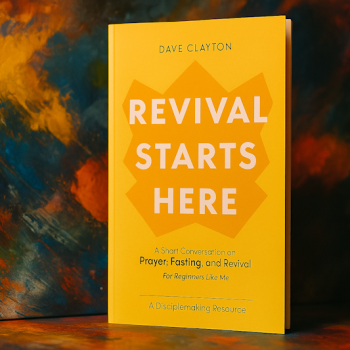
The Lord’s Prayer is more or less the manifesto of Christian faith, it is a revolutionary prayer that reminds us of our relationship to God and it reminds us of all the teachings of Jesus. However, it is more than just a pattern of prayer for the follower of Jesus. In addition to being a trellis that we pattern our prayers by, it is a reflective theological practice that offers profound insights and reminders into how we can live more contentedly in the present moment with what God is doing in us, through us, and with us. This Lead a Quiet Life blog on Patheos pursues understanding 1 Thessalonians 4:11-12, and what it means to lead a quieter life at a slower pace, to discover a simple life and faith that embraces downward mobility in a chaotic world and church obsessed with excess. In that ambitious pursuit of a quiet life, I think the Lord’s Prayer is a help.
As a Doctor of Ministry student at Kairos University, studying the Lord’s Prayer, I, as a result, have been reflecting a lot on the Lord’s Prayer these days. I have begun to realize how this prayer can also help us ambitiously find a slower pace and simple life. The Lord’s Prayer becomes a practice that helps to center God the Father and the Kingdom and will of God at the core of our lives. It is a practice of prayer that can move us toward greater dependence on God, and through confession where we have built our own empires, and it trains our eyes to see what God is doing here and now. Though I won’t focus on all of them right now, I believe that by focusing on the key elements of this pattern of prayer given to us by Jesus, we can learn to appreciate where we are and understand the value of leading a quiet life.
Living in the Present
The Lord’s Prayer begins with acknowledging God and God’s presence from the darkened corners of life in which we are coming. We pray, “Our Father, who is in heaven, holy is your name.” This opening directs our attention to God, but in the places we are here and now, and it is an act inviting us to center ourselves in the present. By starting with reverence and worship, we align our hearts and minds with the reality of our relationship with God, and it is that which we are defined by, reminding ourselves we are not defined by what is happening around us, nor that which we are earning or feeling the vacancy of. This opening statement that seeks God as God, reminds us that no matter what bloody-knuckled prayers we offer, God the Father is still good, and the rule and reign of God (the Kingdom of God) is a taste of eternity that is an ongoing work in our lives and that is all we need to lead a quiet and good life.
Seeing God’s Work
One of the parts of life that I think keeps us from a simple life, from leading a quiet life, is the way discontent keeps us looking elsewhere for fulfillment. There are areas of pursuit in all of our lives, areas that probably keep us moving farther away from God rather than closer, and those pursuits need to be questioned. As we rightly center God in our lives, we pray, trying to embrace the ways, words, and works of God, through the line – “Your kingdom come, your will be done, on earth as it is in heaven.” Certainly, this line calls us to be active participants in God’s work here and now. It is a line that intercedes for the people and places around us that are missing the mark of God’s best. However, even more, it trains our eyes to recognize God’s presence and action in our everyday circumstances. As the rubberband snaps on our run, we are pulled back into reality and we see the fruitlessness of our pursuits, and we train our eyes to see that life is more meaningful at the center of what God is doing. This perspective shift helps us see God in the ordinary and mundane, understanding that every moment is an opportunity to witness and contribute to God’s plan, and it trains our eyes to see where God is already breaking in and bringing about the goodness and good news of the Kingdom of God.
Finding Contentment
The pattern of the prayer which turns over our situations to God, longs to see the good ways of heaven and God’s will invade our street corners and countryside, but it also asks God for our needs, today. Lost in our wilderness moments, grumbling before God like the Israelites with Moses, we beg for God to “Give us today our bread for today.” It is that line that beautifully emphasizes our need for reliance on God for our needs today. It reminds us that here and now, in the problems and pains that define our moments, we need not run from God or question the goodness of God, but rather press in for greater sustenance, reliance, and dependence on God. This line cries out for rescue and relief at the hands of the miraculous intervention with God in ordinary ways and moments of life. This line moves us towards seeing what we do have, and calls us to be grateful for it. Today, we are simply thankful for the bread God has allowed to grace our plates. In this line of the Lord’s Prayer our expectations are curbed, and we learn to expect nothing but become grateful for everything that God is providing in this moment. This focus on daily sustenance teaches us to be content with what we have, trusting that God provides exactly what we need for each moment. It encourages gratitude for the present rather than anxiety about the future.
Leading a Quiet Life
We are not only dependent on God for our daily needs but also for liberation from the cold and damp prison cells that keep us incapacitated. These self-made prisons, like the dungeon of unforgiveness, that we have made for ourselves and for others have become aspects of our life that we have become dependent on. So, after centering God at the core of our lives, asking for God’s ways and not ours, after asking for greater dependence on God, we reflectively cry from our prisons, “Forgive us our debts, as we forgive those who have debts with us.” In this line, we see the ways our pain has kept us dependent on others, and we see the ways we have kept others in pain in debt with us. This is a physical debt (financial) but also a spiritual debt (unforgiveness). This prayer ensures we don’t let a negative balance with God or others keep us disengaged from the mission of God, from our relationship with God and others, but also from being dependent on others in a way that it hurts our testimony and God’s best for us. Paul’s challenge in 1 Thessalonians 4:11-12 charges us to not be dependent on anyone and here at this line in the Lord’s Prayer, we are reminded to check the places we have been dependent through the debts of shame to God, the debts of relationship with others, and the unaddressed hopes for dependency at play in our lives. In feeling a call to lead a quiet life, as we are liberated from our unforgiveness and debts, we ask God to keep us free from falling back into imprisonment, and we say “Lead us not into temptation, but deliver us from evil.” This patterned line of the prayer from Jesus guides us toward a life marked by forgiveness, humility, and simplicity, it keeps us from falling captive to the ways of this world and the trials that lay snares on the trails we traverse. The ambitions that are at war within us, call us ambitiously towards anything but a quiet life are in this line they are questioned in this very moment, and they are realigned with the ambitions of God, asking for God’s guidance to never give in to them again.
The lines of the Lord’s Prayer remind us that each of these patterned elements are crucial points of reflection if we want to pursue a quiet life. In regularly reflecting on the prayer given to us by Jesus, I am convinced we can find a life that is not driven by external chaos but by inner peace and purpose.
Practical Takeaways
- Allow the pattern of the Lord’s Prayer to bring forth more gratitude. Practice daily gratitude by recognizing and thanking God for the blessings of today. This fosters a spirit of contentment and reduces the tendency to worry about the future.
- Allow the pattern of the Lord’s Prayer to bring you more present with God. Incorporate moments of mindfulness and prayer throughout your day to stay grounded in the present, noticing where God is at work around you.
- Allow the pattern of the Lord’s Prayer to bring forth more simplicity and forgiveness. Embrace simplicity in your lifestyle and relationships. Focus on forgiving others and yourself, which contributes to inner peace and a quieter, more meaningful life.
Conclusion
The Lord’s Prayer serves as a timeless guide for orchestrating our lives into the present. It teaches us contentment by highlighting our daily reliance on God, trains us to see God’s ongoing work in us, through us, and around us, and it is a practice promotes a lifestyle of quiet simplicity and forgiveness, liberating us from ourselves, our sins, and our imprisoning ways. By slowing down the Lord’s Prayer, reflectively considering each line of the pattern, and reflecting on the above principles, I find myself learning that we not only can lead more fulfilled lives but also become more attuned to the divine rhythm that underlies our daily existence.













